- Home
- Juliet Marillier
The Well of Shades Page 9
The Well of Shades Read online
Page 9
“Look after,” she said tremulously, taking a cautious sip. “What does that mean? For how long?”
“At least until you are somewhere safe, perhaps at the priory I mentioned. I would see the child delivered home, as well.”
“No!” The cup shook; drops hissed on the hearth. “Saraid’s with me! She’s not going back!” She started to rise to her feet.
“Sit down, Eile. Be reasonable. Whatever’s happened, your aunt and uncle will be out of their minds with worry. They need their daughter home.”
She stared at him, reddened eyes suddenly inimical. The firelight caught the gleam of tears on her cheeks. “Are you stupid or something?” she asked.
Faolan waited, reminding himself that she was very young; that she was shocked and distressed. He listened to the crackle of the fire and the child’s soft breathing.
“She’s not my cousin,” Eile said flatly. “She’s my daughter. She’s mine, and I can take her anywhere I want. And I can’t go to the priory. Not now.”
Faolan stared at her, caught off guard. He wondered if he had been half-asleep at Cloud Hill, to miss what now seemed distressingly obvious. “How old did you say you were?” he asked, and instantly regretted it.
“An infant could add it up.” Her tone was hard. “I was a few months short of my thirteenth birthday when I had her. She’s mine, Faolan, and nobody’s taking her off me. I need to get her away before they find us. I told you.”
“They? Your uncle and aunt?”
She smiled. It was the most alarming expression he’d ever seen on anyone; in that moment he could not believe she was only sixteen. “Not him,” she said. “Not anymore. But Aunt Anda, yes. She’ll have run screaming to the settlement, accusing me, getting them all fired up. I can’t fight a whole mob. All I can do is run. Run far enough so they never catch up.” Her teeth were chattering. Her voice had become a monotone and her eyes stared through him.
Faolan sat on the floor and put his hands around his knees. “I’m not going to make you tell me,” he said quietly. “But I think you should. I’m going to be more use to you if I know what’s happened, Eile.”
“She’s not going back there. And I’m not going to the nuns, they won’t want her, and anyway it’s too close, the story’ll get out and they’ll take Saraid off me.”
“Eile,” Faolan said, “look at me. Come on, look me in the eye. Now listen for a moment. You’re a mother, you’re grown up, you make your own decisions. That doesn’t mean you can’t ask for help if you need it. I’m good at keeping people safe. It’s one of the things I do for a living. A lot of the time I work outside the rules: men’s rules, gods’ rules. I said I’d protect you. I said I’d look after you and Saraid. My bond with your father obliges me to do so.”
“Big talk,” said Eile, wiping her nose on the linen shirt.
“I give you my word. Whatever it is that’s happened, I’ll stand by that promise. I swear it.” Let me not regret this too much in the morning.
She stared at him a moment, then drew a deep, shuddering breath. “I killed him,” she said. “Dalach. I stuck the knife in his heart. I’d told Saraid to get ready and wait outside for me. I did it and we ran.”
“You killed your uncle.” With an effort, he kept his tone level.
“That scum didn’t deserve to be anyone’s uncle. Well, he won’t be trying his tricks on me anymore, or any other girl. He’s had his last bit of fun, the filthy swine. And he won’t be spreading any more lies. Not that it helps; Anda’s just as bad as him. Every person in Cloud Hill believed what they said about me. Everyone.”
“What? What did they say?” His mind was racing: a man left to bleed to death, a flight that must draw attention to her guilt, the aunt raising the alarm… Eile had been right after all. They probably had needed to get over the river tonight. She’d have been slow on the track, carrying the child. Likely there’d be a mob of villagers on the doorstep at dawn, demanding that the killer be brought to quick justice.
“That I’m a filthy slut who’ll open her legs for anyone who’ll give me a crust of bread or a mouthful of ale,” she said bitterly. “That I’ve been rotten from the start. That she’s the child of some wandering drunkard I invited to have me by the wayside when I was barely twelve years old. Everyone believes it. Why wouldn’t they? Dalach’s fist and Dalach’s boot are a great encouragement to agreeing with him.”
“Were,” said Faolan. “Eile?”
“What?” It was a defensive snarl. His heart bled for her.
“Saraid. You said Dalach spread lies about who fathered her; that he persuaded the folk of your community that you were…”
“A whore?”
“Eile, are you telling me she’s Dalach’s child? That he…?” He could not quite make himself put it into words.
“Quick, aren’t you? A surprise gift, you might say, for my twelfth birthday. Dalach’s big. I tried to fight him the first few times. It turned out he liked that.”
Faolan dropped his gaze.
“Don’t know what to say, do you? Or thinking what those men in the village think, ‘Oh, she must have been asking for it.’ All it takes is a man who’s strong and knows how to make threats. My mother was gone. He could do what he liked. Before I had Saraid, I kept running away. I never got far. He wanted me back, and he came and found me. Not this time.”
“Your aunt,” Faolan said. “Why didn’t you tell her? She could have done something to protect you, surely—”
“She knew.” Eile’s voice was a whisper. “She knew all the time. She never did anything to stop him. He knew how to twist her to his will; he beat her, too. After a while she learned to hate me, because he…” She took a breath. “Because he wanted me more than her. He said things. Comparisons. It had to stop. I had to stop it before someone hurt Saraid. She’s only little. Once I had her, there was no running away. He said he’d harm her if I didn’t do what he wanted. He would have done things to her, once she was old enough. So when you left the knife, I knew it was time to make an end to it.”
There was plenty Faolan could have said: that she should have told him everything when they first met; that she should have sought help, perhaps from the women of the village; that a knife is not the best answer, even to the assaults of an evil man.
“You had the luxury of vengeance,” was what he said. “I’ve been denied that. I found out at Cloud Hill that the man who most wronged my family has been dead for four years. The man whose name is on that knife I so conveniently left in your possession. You, at least, had the satisfaction of meting out just punishment. Did it make you feel better?”
“No,” she whispered. “I’m glad he’s gone. I’m glad he can’t hurt Saraid, or anyone else now. But I don’t feel good. I feel… dirty. Scared. Alone.” He saw her do it again, that lift of the chin, the summoning of a formidable will, and he saw her father in her. Beneath the unprepossessing exterior, he saw that she was immensely strong and entirely selfless. “That’s all right,” she went on. “I’m used to being alone. They all go away, and you will, too. We’ll manage.”
“How were you planning to get the dog across the river?” Faolan asked casually.
She stared at him. For a moment her eyes were like the child’s, round and frightened. Then she slumped her shoulders and looked away. “Shut up,” she muttered. “I can cope, I told you.”
He said nothing for a while, his mind trying to come to terms with it and to devise a strategy that would be both possible and acceptable to Eile, for one thing was certain: he could not press her to do anything against her will. Try that and she would be off again in an instant. In her odd way she was every bit as strong as that indomitable warrior Deord. She’d murdered a man. If she was right in her assessment of the aunt, there would be a pursuit and demands for justice. This would not be quietly and conveniently forgotten.
“She loved him,” Eile said as if reading his thoughts. “Funny, isn’t it? After everything he’d done, to her, to me, after all of it, she s
till wanted him. People are strange. Or maybe that’s normal, her and him. Maybe I’m the odd one.”
“Maybe,” Faolan said. “Drink the rest of that, Eile.”
“I don’t really want to sleep.”
“You need rest. I’ll think of a plan. I’m good at them. And I’ll wake you, I promise. There are men coming to mend the bridge in the morning. If we can’t get across here, we’ll find another place.”
“I’m not going to the priory.” The hackles were up again. “I told you. I’m not going.”
“I heard you,” said Faolan, and took a considered breath. “I’ve somewhere else for us to go. It’ll be safe. My father’s a brithem.”
“What?”
“Not the kind who hauls young girls up to answer awkward questions. The kind who understands real justice. They live at Fiddler’s Crossing; it’s not too far for Saraid to go if we take it carefully. I think they’ll shelter you. If not, we’ll go farther.” He did not tell her he had only known since earlier today that his father still lived, and was still a lawman. He did not explain that, for him, going home was like plunging into a well of shadows.
“We?” Her voice was the merest wisp of sound.
“I said I’d look after you. I’ll do so until I know you’re safe. I’ll stay with you until you don’t need me anymore.” He waited for a crisp reprimand, a snapped denial of any such need or a withering statement of disbelief. But Eile said nothing. She gave a little weary nod, then lay down behind Saraid with her arm curved over the child.
He waited until he thought she was asleep, then laid his own cloak over her.
Eile’s eyes opened. “What did he do?” she murmured. “That man you say wronged your family?”
“It’s not a good story for bedtime,” he said shortly. It’s not a story I choose to tell.
“Nor’s mine.”
“Mine is old history. Let’s just say I’ve been away a long time and I’m not sure my family will be pleased to see me. Like you, I left home with blood on my hands.”Enough; no more.
“But then—” She half rose, voice tight.
“My father may not welcome me, but he’s a man of strong principles. That won’t have changed. You’ll be safe there.”
Eile looked less than convinced.
“Rest now,” Faolan said. “I’ll wake you as I promised. Believe me, this will look better in the morning, after a night’s sleep.”
BROICHAN WAS GONE. Between dusk of one day and dawn of the next the king’s druid had packed a little bag, slung a cloak over his shoulders, and ridden away from White Hill without a word. Bridei’s second councillor, Tharan, alerted to the early departure, had come striding down to the stables to express his concern and to question the wisdom of a solitary journey so close to Midwinter. The words had died on his lips as he met the druid’s stone wall of a stare. Never mind that Bone Mother’s grip now tightened on the land, lengthening the nights and filling the days with flailing winds and bone-deep chill. Never mind the frost, the snow, the long, weary ride down the glen to Pitnochie, which was Broichan’s home. Never mind that others were in residence there now, the king’s druid having moved to court six years ago when his foster son became monarch of Fortriu. Meeting Broichan’s eyes, Tharan knew such arguments would be like chaff before the wind, dissipated without purpose. He had known the druid a long time.
After Broichan was gone, the councillor paced restlessly until it was no longer too early to disturb the queen’s slumber, then presented himself at the door to the royal apartments. The new bodyguard, Dovran, had been on duty all night, but his sharp eyes and capable hands on the spear were not suggestive of weariness. Garth had chosen him carefully and trained him expertly.
Tharan was admitted and stood in the anteroom waiting. He had barely time to take a sip of the ale a maidservant brought him before Tuala was there, fully dressed and wide awake, her large eyes wary. She was always pale, but this morning the whiteness of her cheeks spoke of a terrible fear; what but the worst kind of news would bring her husband’s councillor to her quarters so early in the morning?
Tharan hastened to reassure her. “My lady, I regret the intrusion. No cause for alarm. It’s about Broichan…”
Tuala heard him out in silence. When he was done she said, “Thank you for bringing this to me so promptly, Tharan. Do you think he was heading for Pitnochie? Going home?”
“That seems likely.”
“He cannot have forgotten he lent his house to Ana and Drustan for the winter.” Tuala was thinking aloud. “Pitnochie isn’t a place designed to hold both Broichan and others beyond his crew of loyal retainers, at least not for long. It could be awkward. I know Ana does not wish to impose a return to court upon Drustan; he finds it difficult. I wonder if Broichan does intend to stay there.”
“Where else would he go in this inclement season?” asked Tharan. “He’s not well, and he’s no longer young.”
“He’d have been better to retreat to Fola at Banmerren if he wanted to avoid us.” Tuala seemed to be talking to herself; Tharan could not grasp what she meant. “I can’t believe it,” she went on. “To go away, just like that. To leave without saying good-bye to Derelei. To abandon so abruptly the work he was doing. Not to be here when Bridei gets home.” She seemed to remember, belatedly, that she was not alone. He thought she swallowed further words. “It is strange, Tharan. I think we should send someone after him; someone discreet, who can watch from a distance. It would be a job for Faolan. I’m much surprised by the number of times I’ve wished my husband’s right-hand man was back here. There are certain tasks that only he can really be trusted with. I will leave you to find a man, someone with the skill to do this undetected.”
“Not such an easy job, spying on a druid,” commented Tharan.
“It’s not so much spying we need, more of a protective presence. Let me know when you’ve chosen someone, Tharan. We should move quickly. You understand why, I’m sure.”
“Yes, my lady.” Neither the queen nor her husband’s councillor would say a word on the topic of Circinn and its kingship, though each of them had, in fact, been advised of the death of Drust the Boar before Bridei and Aniel left White Hill. There were levels of secrecy and of trust: levels within levels. Such is the nature of a royal court. Each understood the need for silence, especially now, with Broichan gone, Broichan who was the only member of Bridei’s inner circle who had not yet been told this momentous news.
WHEN THARAN WAS gone, Tuala went out to the garden, where a cold morning mist hung over straw-covered herb beds and plots of winter vegetables. All was shrouded in white. She could not see the pines on the hillside below the fortress walls, nor the track that snaked around the rise, leading to a choice of ways: southwest down the Great Glen to Pitnochie, east to Banmerren and Caer Pridne, north to Abertornie and, beyond it, the wild lands of the Caitt. Ana’s journey there had furnished her with a lover who would soon be her husband: Drustan, that enigmatic, beautiful chieftain with his eldritch ability to shift between the forms of man and bird. They were at Pitnochie over the winter, the inclement season making travel back to Drustan’s home territories near impossible. In spring they would journey north and face the daunting prospect of reclaiming what Drustan’s brother had stolen from him on the basis of a lie. Until then, they had withdrawn to Broichan’s isolated holding to recover from the ordeal they had faced in the autumn. They wouldn’t be expecting the druid home.
Tuala walked along the parapet wall, deep in thought. Broichan was not stupid. He’d have no desire to get in the way of a pair of lovers enjoying the privacy of his domain. No, he wouldn’t be planning to stay there. She thought she knew where he would go: off into the forest, somewhere Bridei couldn’t find him. On his own? She hoped not; Broichan was physically frail still, not fully recovered from his long, draining illness. To the forest druids in the nemetons? Maybe. Perhaps, after her revelation, he simply needed a time to reflect, to pray, to reassess his position. There, at least, he would be provid
ed with shelter, sustenance, and companionship.
Tuala sighed. She was trying to make sense of it, but there was no sense. The king’s druid had behaved like a spoiled child. The unwelcome news she had given him had, in effect, made him stamp his foot and run off to hide. He wasn’t trying to comprehend the fact that he had a daughter and a grandson. He was still trying to deny it.
The hardest part to understand was that he would choose to leave Derelei. Perhaps he didn’t realize how a little child could be wounded by the sudden absence of one he had loved and trusted and come to rely on. How could she explain this to her son, who could barely talk yet, for all his masterly skills in magic? Broichan’s gone away was woefully inadequate when the druid had been spending part of every afternoon closeted with the infant, guiding Derelei’s first steps on the journey to discovery of his astonishing abilities.
What now, with Broichan gone? Stop the training? Teach her son herself, a path fraught with risk for, as the king’s wife, she had striven long to divert attention from her difference? She did not know. Perhaps the Shining One would have answers.
As for the question of Circinn and another looming election for kingship, Tuala’s mind wanted to shy away from that, but it was all-important; a major challenge of Bridei’s leadership. If the timing of her revelation had denied Bridei the opportunity to discuss his decision with his foster father, she had made a serious error of judgment. It was vital that Bridei put the matter to Broichan as soon as he and Aniel got back from Caer Pridne. Should Bridei decide as she believed he would, it would be a double blow for the druid: not only would his foster son fail to seize the great opportunity they had both long planned for, but Broichan must face the fact that, of all Bridei’s close advisers, he himself had been the last to be told of Drust’s death with its monumental implications. Broichan must see this as a betrayal.
As for Tuala’s own feelings, they must be set aside. Broichan was her father. Of that she was becoming increasingly certain. If that was not the truth, all he had needed to do was to say so; to provide some other explanation for the vision the goddess had shown them. Instead he had closed in on himself, as if the truth were still too repulsive to contemplate, let alone accept. It hurt. For so long, nearly all her life, she had longed to know who she was, who her father and mother were and why she had been left on the druid’s doorstep for Bridei to find. But she thought she would sooner have no father at all than one who shrank from the very idea of their kinship. Broichan’s love for Derelei could be seen on his face whenever he was with the child; it was in the gentleness of his hands and the softness of that compelling voice. It was in his patience as tutor to such a tiny student. The druid must hate her powerfully to turn his back on Derelei rather than accept their bond of blood. He must still fear her influence on Bridei, as he had done from the first.

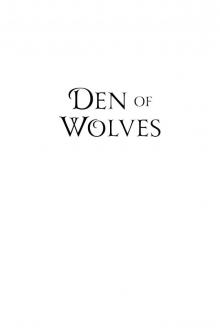 Den of Wolves
Den of Wolves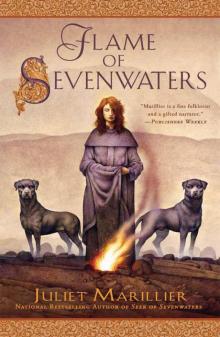 Flame of Sevenwaters
Flame of Sevenwaters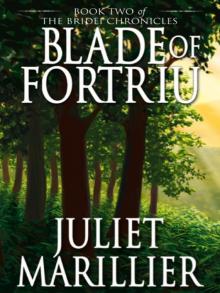 Blade of Fortriu
Blade of Fortriu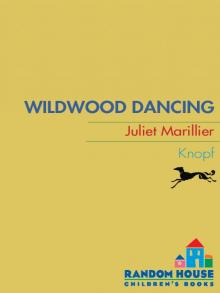 Wildwood Dancing
Wildwood Dancing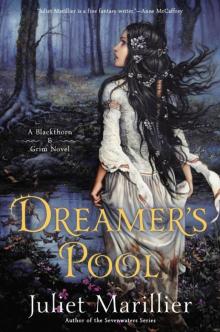 Dreamer's Pool
Dreamer's Pool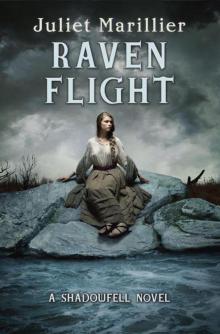 Raven Flight
Raven Flight Heir to Sevenwaters
Heir to Sevenwaters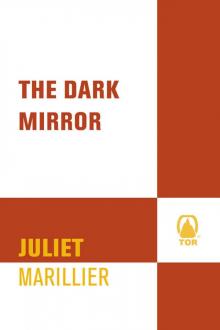 The Dark Mirror
The Dark Mirror Daughter of the Forest
Daughter of the Forest Seer of Sevenwaters
Seer of Sevenwaters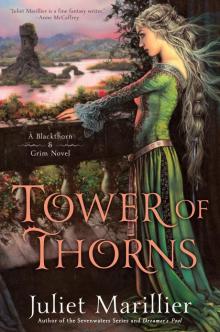 Tower of Thorns
Tower of Thorns Shadowfell
Shadowfell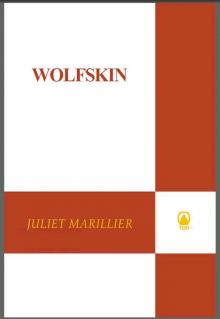 Wolfskin
Wolfskin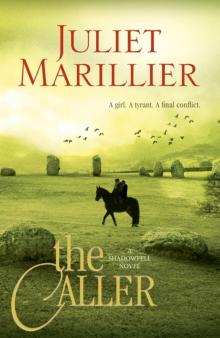 The Caller
The Caller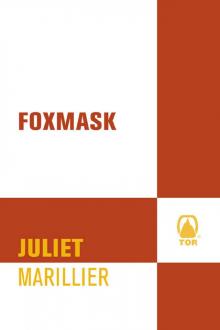 Foxmask
Foxmask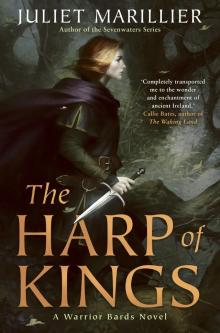 Harp of Kings
Harp of Kings The Well of Shades
The Well of Shades Heart's Blood
Heart's Blood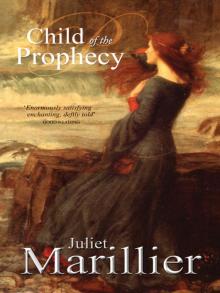 Child of the Prophecy
Child of the Prophecy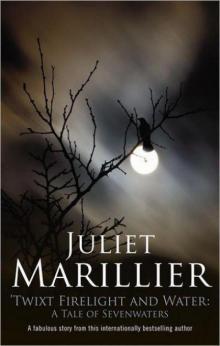 Twixt Firelight and Water
Twixt Firelight and Water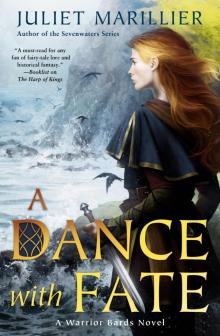 A Dance with Fate
A Dance with Fate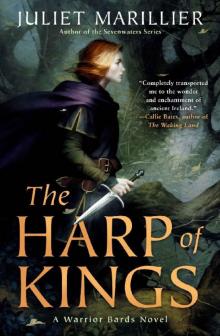 The Harp of Kings (Warrior Bards)
The Harp of Kings (Warrior Bards)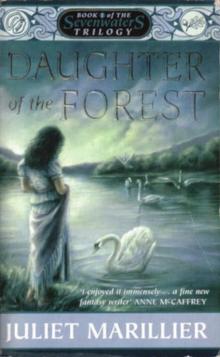 Daughter of the Forest (The Sevenwaters Trilogy)
Daughter of the Forest (The Sevenwaters Trilogy)![Sevenwaters [06] Flame of Sevenwaters Read online](http://i1.bookreadfree.com/i2/04/08/sevenwaters_06_flame_of_sevenwaters_preview.jpg) Sevenwaters [06] Flame of Sevenwaters
Sevenwaters [06] Flame of Sevenwaters![[Sevenwaters 04] Heir to Sevenwaters Read online](http://i1.bookreadfree.com/i2/04/12/sevenwaters_04_heir_to_sevenwaters_preview.jpg) [Sevenwaters 04] Heir to Sevenwaters
[Sevenwaters 04] Heir to Sevenwaters